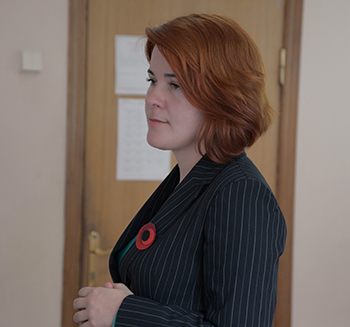
Anna Lenchovska
Ukraine has recently made headlines for its ongoing conflict with Russia, but Anna Lenchovska has helped bring human rights educational resources to the country for nearly 10 years as USC Shoah Foundation’s Ukrainian consultant.
Lenchovska has a master’s in clinical psychology and in 2005 was working as a translator at the Institute of Jewish Studies in Ukraine. She began working on the Shoah Foundation’s first-ever educational guide planned alongside a documentary film: Encountering Memory, a companion to the USC Shoah Foundation-produced documentary Spell Your Name. It was developed by Ukrainian education experts Oleksandr Voitenko and Mykhail Tyaglyy and was a “pioneer multimedia resource,” Lenchovska said, in terms of its use of video testimonies and its presentation of Ukrainian history. To date, it has reached 3,200 teachers at one- and two-day seminars.
“This project may be seen as a transition between our approach of producing documentaries about the Holocaust to reach the general public and an educational approach of working with the film and testimonies with teachers,” Lenchovska said.
Today, as USC Shoah Foundation’s international consultant in Ukraine, Lenchovska plans professional development workshops for educators about teaching with testimony, coordinates new educational materials for the region, and acts as a liaison for scholars, filmmakers, journalists and the general public who want to learn more about the USC Shoah Foundation.
She said she especially enjoys working with teachers, and has met many fascinating and inspiring people over the years. She recalls one teacher who participated in an Encountering Memory professional development workshop who was blind. After the group watched Spell Your Name, he commented that at the beginning of the film there were the sounds of old crows who croaked terribly, but at the end were the voices of young birds that seemed to convey hope. Lenchovska said she’d seen the film many times but had never noticed that.
“I called [the film’s director] Sergii Bukovsky and he said that sound director Igor Barba had especially recorded voices of old and young crows, for the beginning and for the end,” Lenchovska said. “How multiperspective and multilayered is the world and human perception!”
One of the biggest challenges of working in Ukraine, Lenchovska said, has been dealing with Ukraine's struggle to create a more diverse curriculum that acknowledges the past and establish dialogue between victims of various tragedies. History and civic education has completely changed over the years and now follows a more open, democratic approach, she said.
Last year, the Ukrainian multimedia teacher’s guide Where Do Human Rights Begin: Lessons of History and Contemporary Approaches was published on the USC Shoah Foundation website. The guide includes 10 modules, each exploring a different aspect of the study of human rights in the 20th century. Each module includes testimony clips from the Visual History Archive.
Lenchovska said she is proud that teachers USC Shoah Foundation has trained have continued to lead seminars about Where Do Human Rights Begin all over Ukraine despite the country’s current crisis, which has seen human rights violations of its own.
“I was very much afraid that authorities would forbid them to conduct such seminars, but the teachers were able to continue to work despite this fear,” Lenchovska said.